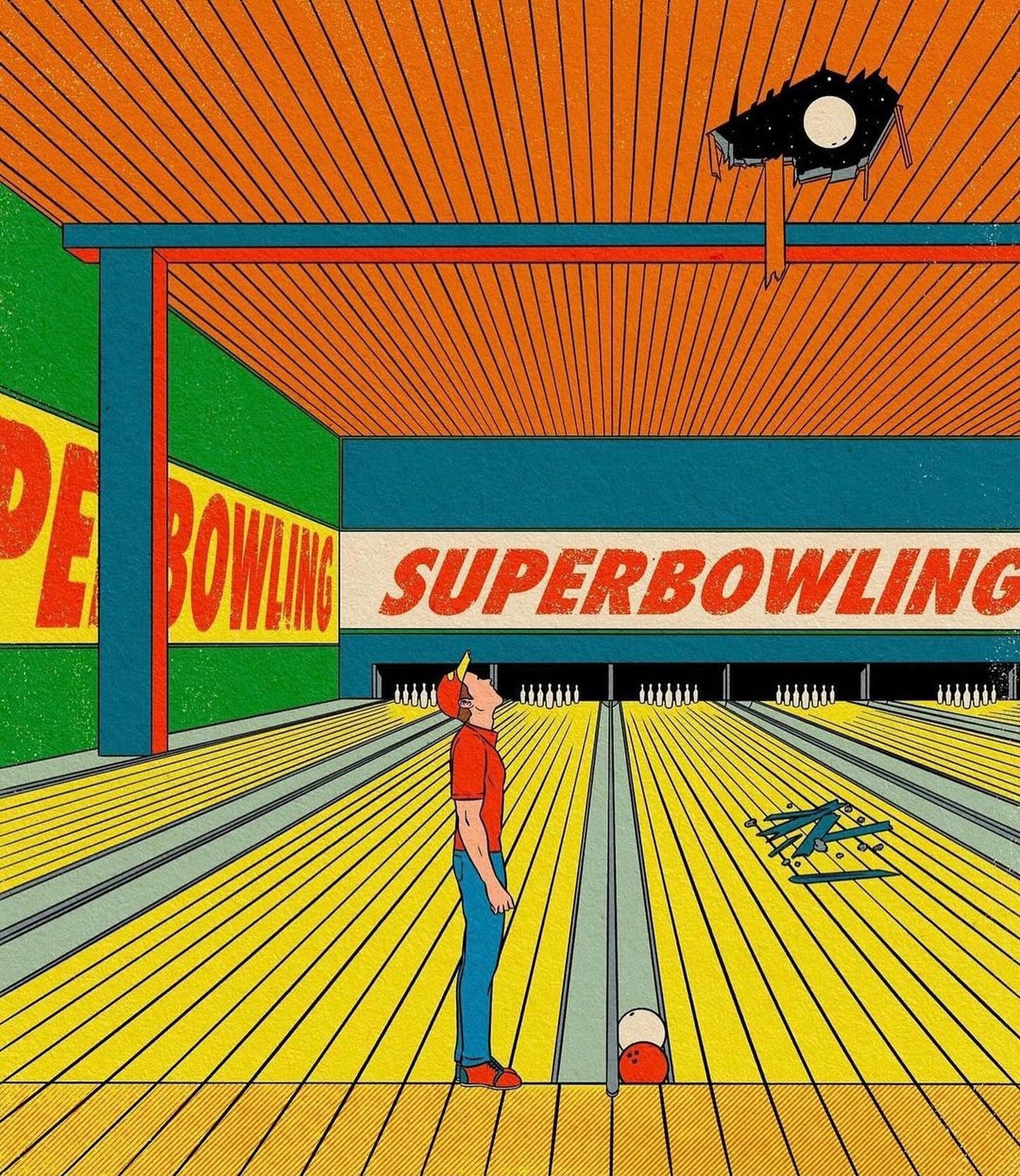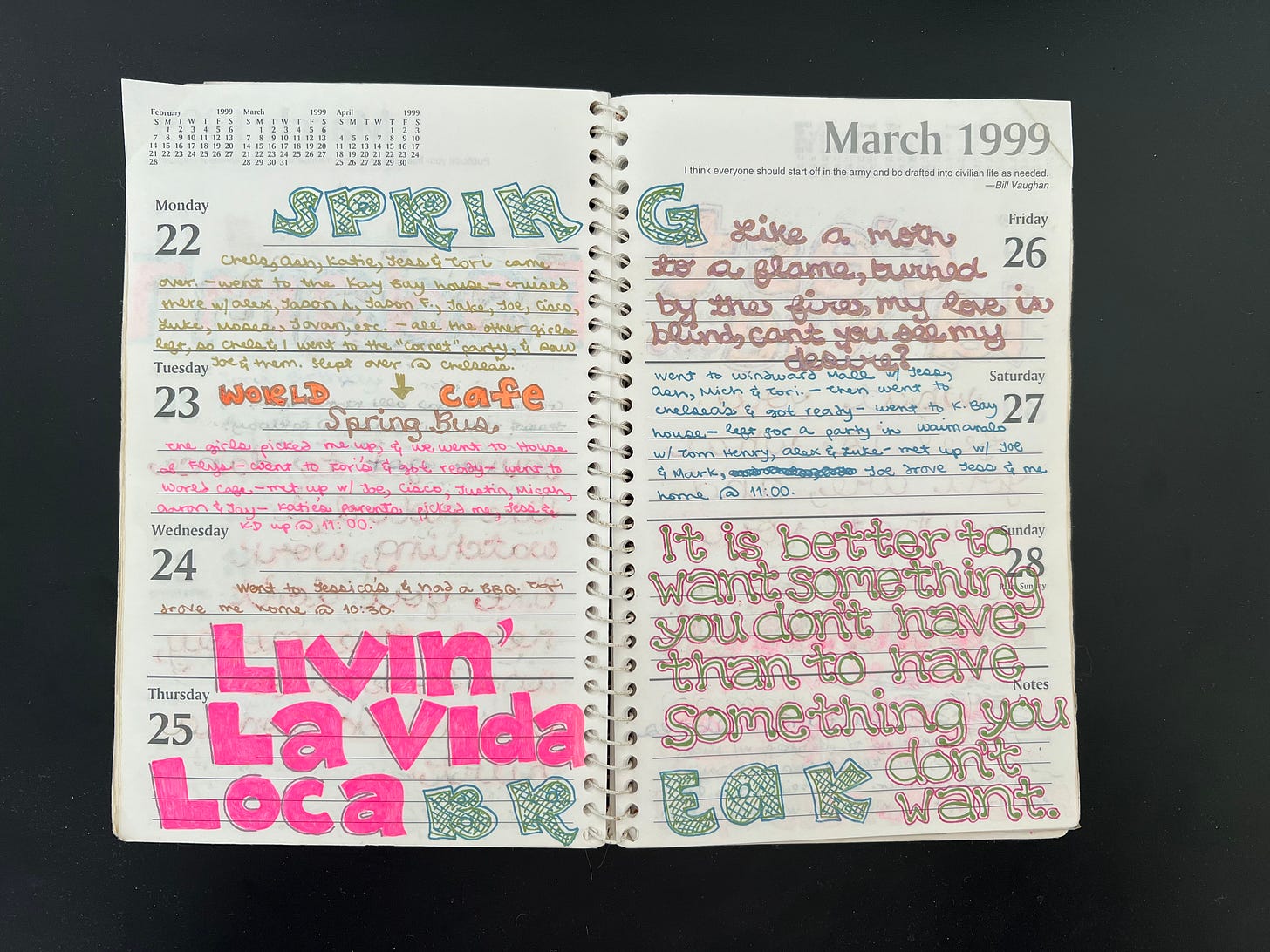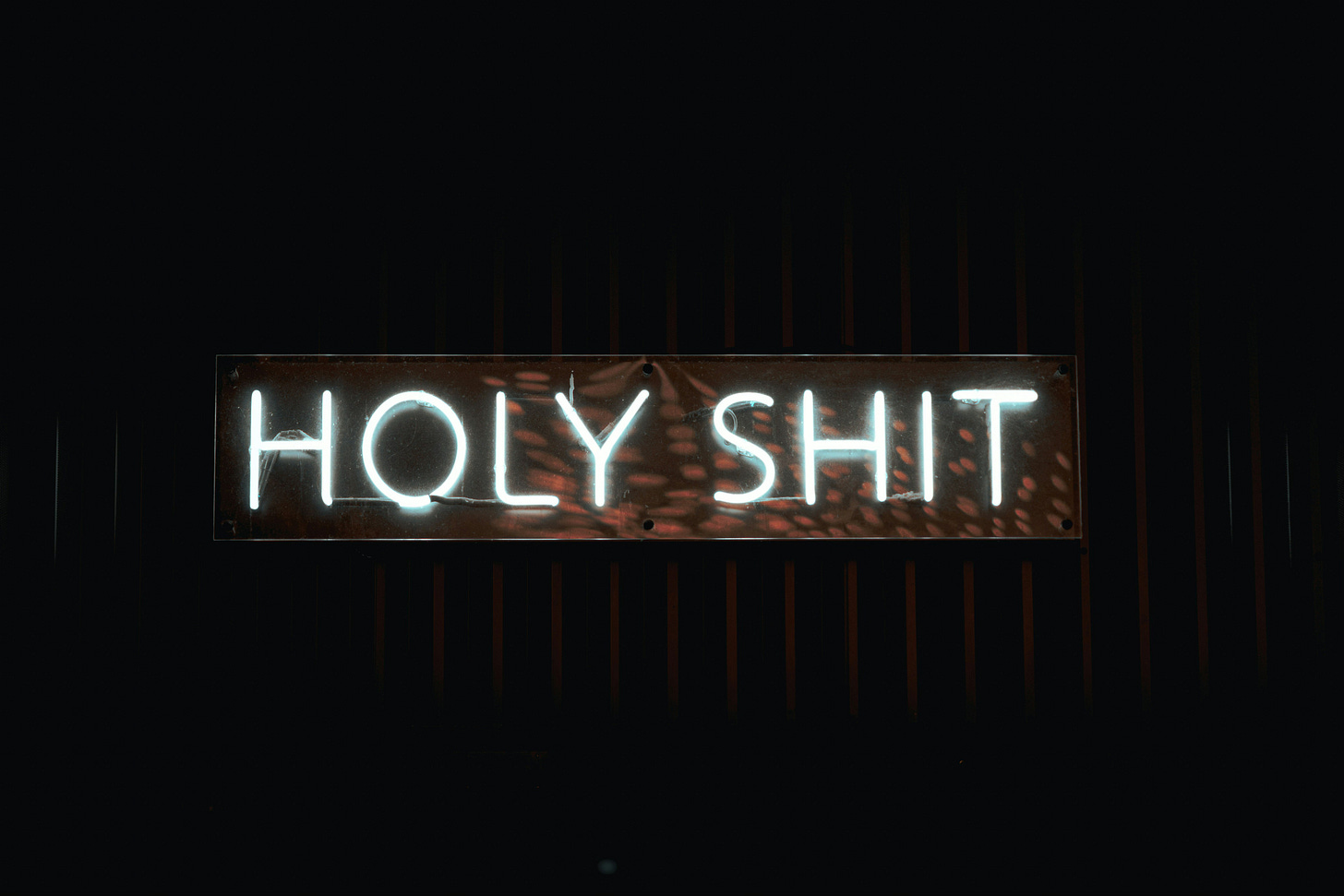
The fancy private high school I attended a million years ago sold these branded spiral-bound planners that my best friend and I lived our lives by. The little notebooks were ostensibly meant to track things like deadlines and tests, and we did use them for that. But also/moreso, we used them as diaries, detailing the mundane details and embarrassing yearnings of our teen days with colorful gel pens in perfect, girlish script.
Fast-forward twenty years, and the aforementioned friend and I have both been recently diagnosed with ADHD—which sheds new light onto our old obsession with organization and documentation.
Until a few years ago, I was an ADHD skeptic, bordering on denier. Every time someone mentioned their symptoms, I’d roll my eyes, thinking: “Well, yeah. Everyone has trouble managing time and sitting still on conference calls and prioritizing boring tasks. Everyone performs and feels better under hard deadlines and on stimulants.” It wasn’t until I broached the subject with my husband, whose brain (thank god) operates very differently from mine, that I began to explore the possibility that I was wrong about what everyone’s brain was like—and why. Each new piece of information—served to me faster and faster, as the algorithm caught on to my curiosity—nudged me closer to pursuing my own diagnosis: The excitement followed by burnout. The struggle to start tasks, even when they’re things I want to do. The anxiety around time (ie feeling like I never have enough.) The anger that flares up when my concentration is broken. When I learned of the connection between ADHD and dopamine, and that ADHD is frequently misdiagnosed as depression in women, I could no longer ignore the (glaring, screaming, neon) signs.
While I’m a social person, I’m extremely introverted (could literally go days without speaking to another person and be perfectly fine with that) and I’ve always struggled with feelings of being unheard and misunderstood. I’m a die-hard perfectionist. In school, I was really advanced in certain subjects (languages, the arts) and behind in others (science, math) and I eventually learned to completely avoid things I wasn’t automatically good at. I’m a big list-maker and extremely organized, because if I’m not, things fall apart. I need instructions to be in writing, so I can read them over and over. To that point, I’m great at memorizing text but completely useless at directions and I’m constantly getting lost (I joke that this is why I married a geographer.) I’m best when I have multiple projects going at once and can’t stand to be bored; I have a quick temper and I frequently interrupt people, though I (truly!) try very hard not to. I have a tendency to hyper-fixate on random things, often as a coping mechanism or mode of procrastination. I have a habit of switching topics mid-sentence, which drives my husband crazy. I can’t watch foreign films in languages I don’t understand, because I get too distracted to read the subtitles—and I’ve always had these traits. I’ve always just considered them to be (sometimes useful, sometimes frustrating) facets of my personality.
My parents have told me many times that when I was a kid, they worried something was wrong with me—and, mind you, they are both clinical psychologists. But I came of age at the turn of the century (eek), when the poster child for ADHD was a young boy disrupting English class. Despite their profession, I don’t think my parents ever considered the idea that their high-functioning eldest daughter (the one with so much potential!) had the neurobehavioral disorder—not even when they found her wide awake in the middle of the night, super stressed about a project that wasn’t due for several days. For a while, I thought I had an anxiety disorder (children of therapists love to self-diagnose) but the symptoms didn’t quite match up. When my psychiatrist told me that she was diagnosing me with ADHD, my eyes welled up with relief. Suddenly, the loose, scattered pieces rattling around in my brain clicked into place.
I’ll admit, part of me is embarrassed to be a cliché. The demographic of midlife women being diagnosed with ADHD is growing at a shocking rate. (PS lol @ the image in that article of a “40-something woman.) I’ve come across a few theories why, the most common being that the overwhelm of motherhood brings symptoms to the forefront. But I personally know several women my age who are not mothers, and who were recently diagnosed. This article (actually an excerpt from ADHD FOR SMART ASS WOMEN: How to Fall in Love with Your Neurodivergent Brain by Tracy Otsuka, which I plan to read ASAP) posits that the drop in estrogen that happens when women reach their 40’s may be the real culprit—which makes sense, given estrogen’s affect on serotonin and dopamine. And once again, I think back to all the times I assumed I was depressed (because that’s what my therapist parents called it) and wonder if that was ever a fair assessment.
My parents have told me many times that when I was a kid, they worried something was wrong with me—and they are both clinical psychologists.
Long before my diagnosis, I learned to manage my idiosyncrasies (ahem, symptoms) in order to function in modern society. I now know that this is called masking, and that my career in social media (where compulsive multi-tasking and a short attention span are not just accepted, but expected) is probably part of it, or even a result of it. Throughout my twenties, I juggled multiple jobs—as an actress, a writer, a waitress. I’m a hard worker, and I like to work, but I hate being someone else’s employee. I need to be busy and I need to be in charge of the busyness, because nothing is worse than having to do mental labor when my mind is spent. I need to be able to take breaks when I need them—and this brings us to 3 years ago, when I became a mom.
While I was pregnant, my (amazing) OBGYN outlined treatment options for PPD. She told me that given my history of (alleged) depression, I should be prepared to experience some after giving birth. But I didn’t. Actually, surprisingly, I felt fine in that regard. I was exhausted, sure, and overwhelmed—but I wasn’t depressed. I believe this is due to a few things, most notably the fact that I have an exceptionally involved, supportive and capable partner. But also, before our son entered the world, I made a strategic choice: I set aside the creative project I’d been working on—the novel I’d been drafting in my spare time between work and social obligations. I’m someone who needs an artistic outlet to feel like myself, but I knew that caring for an infant wouldn’t leave me much time or energy for it. So I decided to shelve it for a year or two, until I was solid enough to incorporate it back into my life. By removing a major preoccupation, I made way for another. This was the right choice, of course—but I really, really missed writing and knew that I would eventually have to figure out how to add it back to my life. Always, beneath the hectic surface of running a small business and having a baby at the peak of a global pandemic (and then selling and buying a house, and moving when said baby was a year old) that was the goal: to make my way back to my novel, and to finish it.
In 2023, with my workload lighter and 2-year-old in daycare full-time, I decided to revisit my manuscript. Lo and behold, it was shittier than I remembered—but I felt called to it in a way that I couldn’t ignore, and also surprisingly capable. Despite the confusion and distraction that frequently clouds my mind, I can see my novel (still) like a cobweb, delicate and intricate and spread in every direction. It’s hard to explain, but Rebecca Makkai’s two Substack pieces on writing with ADHD do a good job.
I began, little by little, to outline and rewrite and brainstorm—while at the same time being pulled in a million other directions, by concerns that didn’t exist when I first started writing. Despite the fact that I felt motivated and exciting about writing again, the framework I’d carefully built to prop myself up collapsed under the weight of one too many priorities. I collapsed.
For the past year or so, I’ve been trying to figure out exactly (to use my parents’ technical term) what was wrong with me, and how to fix it. I tried antidepressants, which kinda helped but mostly didn’t. I’ve tried so many potential cures for chronic insomnia (another thing I suffer from) and that’s still a work in progress. I’ve added probiotics and other supplements to my diet. I’m (sorta, slowly) learning to meditate, and I’m doing yoga again (after taking an extended break due to an injury.) Little by little, I’m piecing together a new way of living—one that allows me to better predict and adjust my reactions to outside stimuli, to prevent myself from resorting to the behaviors that historically led to self-sabotage.
I realize that this all sounds very positive and empowering and uplifting—and it is, to an extent. But the sad side is that I’ve also spent a lot of time thinking about the years I lost to burnout and brain fog and low self-esteem; of the things I wanted so badly but failed to achieve. When I think of those things, I can’t help but mourn. I can’t help but wonder what might have been, had I received this clarity (and pharmaceutical assistance) sooner. I surely wouldn’t have the career I currently have, or live in the city I live in—which means I wouldn’t be married to my husband, or be Mommy to my son. And that’s where the grieving stops, because I can’t think of my family and feel anything short of wondrous gratitude. My life is not the one I dreamed of when I was younger, but it’s a dream nonetheless. It reinforces an old belief that I’m incredibly lucky, and that gives me the confidence to try new things (like this newsletter) even if I fail. Because I have failed, over and over—and that failure has proved to be just as (if not more) serendipitous than any success.
So, here goes nothing.
ALSO ON MY MIND:
The caption on this post, which ties neatly into the overarching theme of this newsletter.
My Year of Rest and Relaxation by Ottessa Moshfegh because YES, I know I’m late to the party but I recently finished it and can’t stop thinking about the ending.
Daddy by Emma Cline, and how I (and everyone else) should really read more short story collections.
The Resort, which is my favorite TV show that no one’s talking about. The storyline is so original, the setting is gorgeous, the cast is fantastic, and a second season is supposedly in the works (!) I highly recommend for anyone who liked The Curse.
The fascinating use of music in Season 5 of Fargo (The Nightmare Before Christmas references! That haunting cover of Toxic!) and why there don’t seem to be any think pieces on this (??)
This piece by Stephanie Danler because she’s one of my favorites and it’s just so incredibly, heartbreakingly good.
This litter box situation that almost makes me want to get a cat.
Scalloped furniture—see here, here, here, and here (that last one I actually own!)
Finding new things to do with Magna-Tiles, like this and this, because my son is obsessed.
The fact that this little girl has better style than I ever will.
Who knew I could be obsessed with a shopping cart?
Rushing to do this in my son’s bedroom before he develops his own aesthetic and/or tells me to leave his room alone.








This was beautiful. Making space for all the varied feelings--the grief, the relief (why do they rhyme? Does this mean something?). I can’t wait to read more 💕💕 Also you’ve convinced my the new season of Fargo is my next watch. 📺